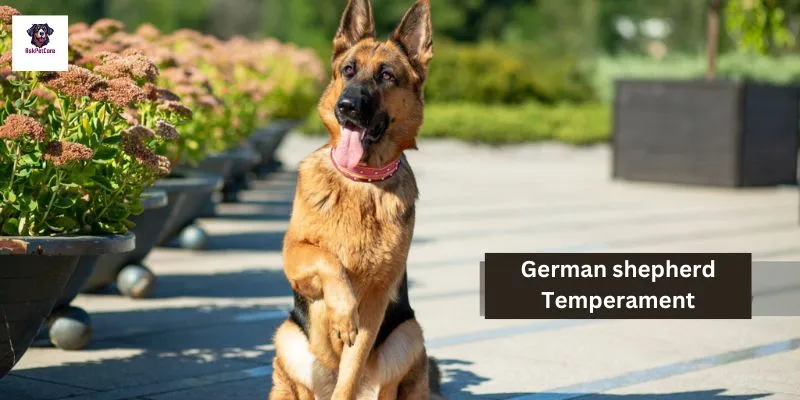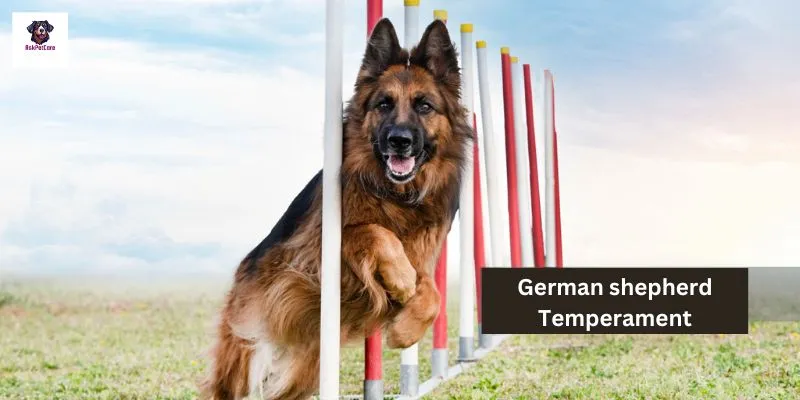A Guide to Understanding Shepherd Temperament
Hello, dog lovers today I will explain in detail about German shepherd temperament.
German Shepherds are famous and loved dogs because they have great personalities and can do many different things. People all over the world love them for being loyal, smart, and protective. In this guide, we’ll talk about what makes German Shepherds special. We’ll look at their behaviors, what makes them who they are, and how they act. Whether you’re thinking about getting a German Shepherd or just interested in learning more about them, come along as we explore what makes their personalities so charming.

Hello everyone who loves dogs! I’m Dr. Arif Aziz, and I’ve been taking care of pets especially dogs at my clinic for a long time, exactly 14 years! I’m here to share some valuable information with you that I’ve gathered from books during my study time written by experts in veterinary medicine (DVM) and MSC (Master of Science), as well as from my own experiences working with dogs.
- Brief Overview of German Shepherds as a Popular Dog Breed
German Shepherds are among the most recognizable and beloved dog breeds globally. Renowned for their intelligence, versatility, and striking appearance, they have captured the hearts of dog fans for decades.
Originally bred in Germany in the late 19th century, German Shepherds were developed for their exceptional herding abilities, but their impressive skills have led to their widespread use in various roles, including police work, search and rescue, and as loyal family pets. With their noble bearing, keen intellect, and unwavering loyalty, German Shepherds have rightfully earned their place as one of the most popular dog breeds worldwide.
- Introduction to the Concept of Temperament in Dogs
Temperament refers to a dog’s personality or disposition, including their behavior patterns, reactions to stimuli, and overall demeanor. Just like humans, dogs have unique temperaments shaped by a combination of genetic factors, early experiences, and environmental influences. Understanding a dog’s temperament is crucial for predicting their behavior and providing suitable care and training.
While breed tendencies can offer insight into a dog’s temperament, each dog is unique, and factors such as socialization, training, and owner interaction play significant roles in shaping their temperament. By recognizing and appreciating the nuances of canine temperament, owners can better understand and nurture their dogs’ emotional well-being, fostering harmonious relationships and fulfilling companionship.

II. Understanding the German Shepherd Temperament
- Description of the Typical German Shepherd Temperament Traits
German Shepherds are known for their characteristic temperament traits that make them beloved companions and versatile working dogs:
- Loyalty: German Shepherds are fiercely loyal to their families and often form strong bonds with their owners.
- Intelligence: They are highly intelligent dogs, capable of learning complex tasks and commands quickly.
- Alertness: German Shepherds are naturally vigilant and alert, making them excellent watchdogs.
- Courage: They possess a fearless nature and are known for their bravery, often fearlessly protecting their loved ones.
- Trainability: German Shepherds are eager to please and respond well to training, making them suitable for various roles, including police work, search and rescue, and therapy.
- Protectiveness: They have a strong protective instinct and may exhibit territorial behavior, especially when it comes to safeguarding their home and family.
- Factors Influencing Temperament, Including Genetics and Upbringing
The temperament of a German Shepherd is influenced by various factors, including:
- Genetics: Genetic predispositions inherited from their parents play a significant role in shaping a German Shepherd’s temperament. Traits such as temperament, behavior, and disposition can be passed down through generations.
- Early Socialization: Experiences during the critical socialization period in puppyhood have a profound impact on a German Shepherd’s temperament. Positive interactions with people, animals, and various environments help build confidence and reduce the likelihood of fearfulness or aggression later in life.
- Training and Handling: The type of training methods used and the consistency of training efforts can influence a German Shepherd’s temperament. Positive reinforcement techniques that focus on rewards and praise help foster desirable behavior and strengthen the bond between dog and owner.
- Environment: The environment in which a German Shepherd is raised also plays a significant role in shaping their temperament. A stable, nurturing environment with plenty opportunities for exercise, mental stimulation, and social interaction contributes to a well-adjusted and balanced dog.
By understanding the interplay of genetics, upbringing, and environmental factors, owners can provide the necessary guidance and support to cultivate a German Shepherd’s desirable temperament traits and ensure a happy, well-rounded companion.

III. Positive Traits of German Shepherds
- Loyalty and Devotion to Their Owners
German Shepherds are renowned for their solid loyalty and devotion to their owners. They form deep emotional bonds with their human companions and are fiercely protective of their families. This loyalty is evident in their willingness to stand by their owners through thick and thin, providing companionship, comfort, and unwavering support.
Whether it’s following their owners around the house, eagerly awaiting their return home, or displaying affectionate gestures, German Shepherds consistently demonstrate their undying loyalty and devotion, making them cherished members of the family.
- Intelligence and Trainability
One of the hallmark traits of German Shepherds is their exceptional intelligence and trainability. Ranked among the most intelligent dog breeds, they possess keen minds and a natural aptitude for learning. German Shepherds thrive on mental stimulation and enjoy engaging in activities that challenge their intellect, such as obedience training, agility courses, and interactive games.
Their eagerness to please and quick learning ability make them highly trainable companions, capable of mastering a wide range of commands and tasks. Whether it’s performing complex obedience routines or excelling in specialized roles such as search and rescue or therapy work, German Shepherds consistently showcase their intelligence and trainability, making them valued partners in various endeavors.
- Protective Instincts and Suitability for Guard and Service Roles
German Shepherds are renowned for their innate protective instincts and suitability for guard and service roles. Bred originally as herding and guarding dogs, they possess a strong sense of responsibility for protecting their territory and loved ones. Their natural alertness, courage, and assertiveness make them well-suited for roles that require security and protection, such as police work, military service, and home guarding.
German Shepherds excel in tasks such as patrolling boundaries, deterring intruders, and providing assistance to individuals with disabilities. Their steadfast dedication to keeping their families safe and their unwavering commitment to duty make them invaluable assets in roles that require reliability, loyalty, and courage.

IV. Challenges of the German Shepherd Temperament
- Potential for Aggression if Not Properly Trained and Socialized
While German Shepherds are known for their loyalty and protectiveness, they can exhibit aggression if not properly trained and socialized. Without adequate guidance and socialization from a young age, they may develop fearfulness, anxiety, or territorial behavior, leading to potential aggression toward unfamiliar people or animals. Owners must provide consistent training, positive reinforcement, and exposure to various social situations to help German Shepherds develop into well-adjusted and confident companions.
- High Energy Levels Requiring Sufficient Exercise and Mental Stimulation
German Shepherds are highly energetic dogs with a need for regular exercise and mental stimulation. Without adequate outlets for their energy, they may become bored, restless, or even destructive.
Owners must provide daily opportunities for physical activity, such as long walks, runs, or play sessions, to help them burn off excess energy and maintain their physical health. Additionally, engaging their minds with interactive toys, puzzle games, and obedience training can help satisfy their need for mental stimulation and prevent behavioral issues associated with boredom.
- Sensitivity to Their Environment and Potential for Anxiety
German Shepherds are sensitive dogs that can be prone to anxiety or stress in certain environments. Changes in routine, loud noises, or unfamiliar situations may trigger anxiety responses in some individuals. It’s essential for owners to be familiar to their German Shepherd’s body language and behavior signals, such as pacing, panting, or excessive barking, which may indicate signs of stress or anxiety.
Creating a calm and predictable environment, providing comfort and reassurance during stressful situations, and gradually exposing them to new experiences can help alleviate anxiety and promote emotional well-being in German Shepherds.
By understanding and addressing the challenges associated with the German Shepherd temperament, owners can proactively manage their dog’s behavior and ensure a happy, healthy, and harmonious relationship with their beloved companion.

V. Tips for Raising a Well-Tempered German Shepherd
- Early Socialization and Training to Promote Positive Behavior
Early socialization and training are essential for shaping a well-tempered German Shepherd. Introducing your puppy to various people, animals, environments, and experiences from a young age helps them develop confidence, resilience, and good manners. Positive reinforcement training techniques, such as rewards and praise, encourage desirable behaviors and strengthen the bond between you and your German Shepherd.
- Providing Adequate Exercise, Mental Stimulation, and Companionship
German Shepherds thrive on physical activity, mental stimulation, and companionship. Regular exercise, such as walks, runs, or playtime, helps them burn off energy and stay physically fit. Engaging their minds with interactive toys, puzzle games, and training sessions satisfies their need for mental stimulation. Additionally, spending quality time together, such as cuddling on the couch or participating in activities, strengthens the bond between you and your German Shepherd and promotes emotional well-being.
- Establishing Clear Boundaries and Consistent Leadership
German Shepherds thrive in environments with clear boundaries and consistent leadership. Establishing rules, routines, and expectations from the beginning helps your dog understand what is expected of them and promotes a sense of security and stability. Consistent leadership involves being firm yet fair, providing guidance and direction, and reinforcing positive behaviors while correcting undesirable ones. By setting clear boundaries and being a reliable leader, you can help your German Shepherd feel safe, respected, and well-adjusted.

VI. Myth vs. Reality: Debunking Common Misconceptions
- Addressing Misconceptions About Aggression and Temperament
One common misconception about German Shepherds is that they are inherently aggressive dogs. While they have protective instincts, aggression is not a defining trait of the breed when properly trained and socialized. German Shepherds can be loving, loyal, and well-behaved companions with the right guidance and care.
- Explaining the Importance of Responsible Ownership and Training
Responsible ownership and training are paramount for ensuring a well-tempered German Shepherd. Proper socialization, positive reinforcement training, and consistent leadership are essential for shaping their behavior and preventing issues such as aggression or anxiety. By investing time, effort, and patience into their upbringing, owners can enjoy a fulfilling and harmonious relationship with their German Shepherd based on mutual trust, respect, and companionship.

VII. Real-Life Stories and Examples
- Personal Anecdotes Highlighting the Diverse Temperaments of German Shepherds
- Max’s Loyalty: Max, a German Shepherd, showcased unwavering loyalty when his owner fell ill. Despite being typically reserved around strangers, Max stayed by his owner’s side throughout their recovery, providing comfort and companionship when it was needed most.
- Luna’s Intelligence: Luna, a German Shepherd puppy, impressed her owners with her remarkable intelligence. She quickly learned a variety of commands and tricks, demonstrating her eagerness to please and her keen ability to grasp new concepts.
- Rocky’s Protective Instincts: Rocky, a trained service dog, demonstrated his protective instincts when he alerted his owner to an approaching stranger in a parking lot. His quick thinking and self-confident behavior helped prevent a potentially dangerous situation, highlighting the value of his natural instincts.
- Success Stories of Well-Trained and Well-Adjusted German Shepherds
- Bella’s Therapy Work: Bella, a German Shepherd rescue, found her calling as a therapy dog. Through proper training and socialization, Bella overcame her initial shyness and anxiety to become a beloved companion to patients in hospitals and nursing homes. Her gentle demeanor and loving nature brought comfort and joy to countless individuals in need.
- Max’s Search and Rescue Skills: Max, a certified search and rescue dog, played a crucial role in locating a missing child in his community. Max’s exceptional scent-tracking abilities, combined with his unwavering determination and focus, led to the successful reunion of the child with their family, highlighting the invaluable contribution of well-trained German Shepherds in emergencies.
- Sasha’s Agility Success: Sasha, a German Shepherd with boundless energy, excelled in agility competitions. Through consistent training, Sasha mastered intricate obstacle courses with speed and precision, earning numerous accolades and championships. Her agility success showcased the athleticism and versatility of German Shepherds in competitive sports.
These real-life stories and examples illustrate the assorted temperaments and capabilities of German Shepherds, from their loyalty and intelligence to their protective instincts and success in various roles. Through proper training, socialization, and responsible ownership, German Shepherds can fulfill their potential as loving companions, reliable protectors, and valuable contributors to society.

Is a German Shepherd a Good Family Dog?
German Shepherds can make excellent family dogs under the right circumstances. They are known for their loyalty, intelligence, and protective instincts, which can make them wonderful companions for families who provide them with proper training, socialization, and attention. German Shepherds are typically affectionate and devoted to their families, often forming strong bonds with all members, including children.
However, it’s important to note that German Shepherds are active and energetic dogs that require regular exercise, mental stimulation, and companionship. Families considering a German Shepherd should be committed to meeting their needs and providing a loving and structured environment to ensure a positive relationship and a well-adjusted family pet.
Are German Shepherds Friendly or Aggressive?
The temperament of a German Shepherd can vary depending on factors such as genetics, socialization, and training. While German Shepherds are not inherently aggressive, they are known for their protective instincts, which can manifest as assertive behavior in certain situations.
With proper socialization and training, German Shepherds can be friendly, well-mannered, and sociable companions. They are often loyal and affectionate towards their families and can get along well with children and other pets when raised together. However, German Shepherds may exhibit territorial behavior or suspicion towards strangers if not properly socialized or if they perceive a threat to their family or territory. It’s essential for owners to provide consistent training and positive reinforcement to help their German Shepherds develop into well-adjusted and confident dogs.
Can German Shepherds Be Left Alone?
While German Shepherds thrive on companionship and enjoy being with their families, they can typically tolerate being left alone for reasonable periods, provided their needs are met. However, owners need to ensure that their German Shepherds receive sufficient exercise, mental stimulation, and attention when they are home alone.
Leaving a German Shepherd alone for extended periods without proper exercise and enrichment can lead to boredom, anxiety, and undesirable behaviors such as excessive barking or destructive chewing. Providing interactive toys, puzzle feeders, and a comfortable environment can help keep a German Shepherd stimulated and content when left alone.
Does a German Shepherd Bark a Lot?
German Shepherds are known for their vocal nature and may bark to communicate a variety of needs or emotions. While some German Shepherds may bark more than others, excessive barking can be a behavior issue that requires attention and training. German Shepherds may bark to alert their owners to potential dangers, express excitement, or seek attention. However, excessive or nuisance barking can be a sign of boredom, anxiety, or frustration.
It’s important for owners to address the underlying cause of excessive barking through positive reinforcement training, providing adequate exercise and mental stimulation, and addressing any potential triggers or stressors in the environment. With proper training and management, German Shepherds can learn to bark appropriately and be respectful of their owners’ needs and preferences.
I hope you will thoroughly understand about German shepherd temperament still any quarry contact me.
Here are some reference books that are considered authoritative on the topic of dog care, including nail care:
- “The Complete Dog Owner’s Manual” by Dr. Bruce Fogle
- “The Ultimate Guide to Dog Care: Everything You Need to Know to Keep Your Dog Happy and Healthy” by Amy Marder and Andrew Luescher
- “The Veterinarians’ Guide to Natural Remedies for Dogs: Safe and Effective Alternative Treatments and Healing Techniques from the Nations Top by Martin Zucker
